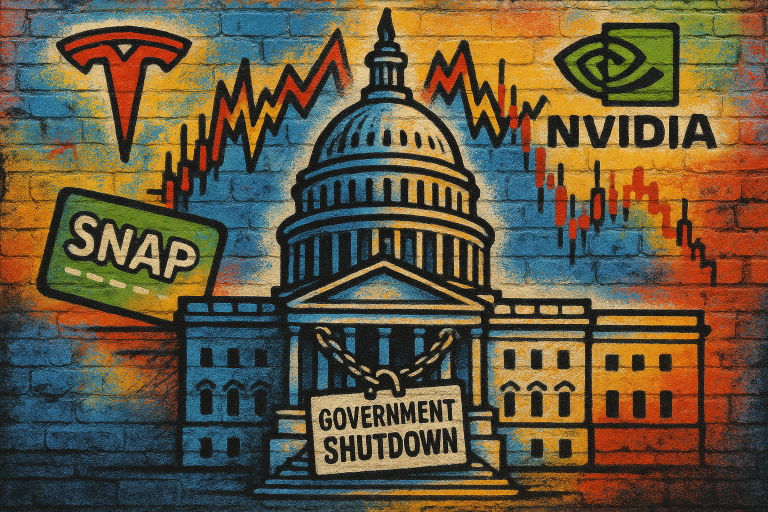The United States faces a confluence of political and market turbulence as the government shutdown becomes the longest in history, federal food aid faces legal challenges, and investors react to major developments involving Tesla and Nvidia.
Meanwhile, law enforcement made key arrests in a high-profile Boston investigation, and the White House reiterated its stance on restricting AI chip exports to China.
US Government shutdown hits record length
The ongoing US government shutdown has officially become the longest in the country’s history, entering its 35th day with no resolution in sight.
Millions of Americans are grappling with the growing fallout, as federal workers remain unpaid and public services—from housing assistance to small business loans—remain frozen.
On Tuesday, the Senate failed for the 14th time to pass a short-term funding bill that would have reopened the government.
The measure, which aimed to fund operations until November 21, fell short of the required 60 votes, with the chamber voting 54–44.
Despite bipartisan frustration, voting patterns remain largely unchanged.
House Speaker Mike Johnson (R–Louisiana) admitted that “none of us expected it would drag on this long,” while Senate Majority Leader John Thune (R–South Dakota) expressed optimism that lawmakers were “getting close to an off-ramp.”
A bipartisan group of House legislators has introduced a framework to extend expiring health insurance subsidies for two years in an effort to break the deadlock, but it remains unclear whether the Senate will support the proposal.
SNAP benefits become a political flashpoint
President Donald Trump escalated tensions on Tuesday by announcing that the administration would suspend all Supplemental Nutrition Assistance Program (SNAP) benefits during the shutdown, contradicting a federal court order issued the previous day.
Trump said benefits would resume only once Democrats agreed to pass a stopgap funding bill.
His remarks conflict with assurances administration lawyers gave to US District Judge Jack McConnell, who had ordered partial funding for November’s benefits for about 42 million Americans.
The administration’s refusal to use an additional $4 billion in contingency funds has drawn criticism from advocates and plaintiffs’ attorneys, who argue the decision is unlawful.
White House Press Secretary Karoline Leavitt defended the administration’s handling, blaming “Democratic obstructionism” for the delay in SNAP disbursements.
White House stands firm on Nvidia chip sales to China
Press Secretary Karoline Leavitt also reiterated the administration’s position that Nvidia’s Blackwell AI chips will not be sold to China “at this time.”
She emphasized that the president’s stance is clear and that national security concerns remain paramount.
Treasury Secretary Scott Bessent, however, signaled in a separate interview that the US may reconsider its restrictions in the future as technology evolves.
FBI arrests two in Harvard medical school explosion
The FBI’s Joint Terrorism Task Force arrested two Massachusetts men linked to last weekend’s explosion at Harvard Medical School’s Goldenson building.
The blast, described as “intentional,” occurred early Saturday morning.
Surveillance footage showed two masked individuals fleeing the scene.
Federal prosecutors are expected to hold a press briefing later today.
Tesla faces investor backlash over Musk’s $1 trillion pay package
Tesla shares fell 4.2% to $448.50 on Tuesday as investor uncertainty mounted ahead of a shareholder vote on CEO Elon Musk’s proposed $1 trillion compensation package.
Norway’s $1.9 trillion sovereign wealth fund—Tesla’s largest institutional investor—announced it would vote against the plan, citing concerns over dilution and “key person risk.”
Other major funds, including CalPERS and the New York State Retirement Fund, have also voiced opposition, while ARK Invest and the Florida State Board of Administration expressed support.
Analyst Dan Ives of Wedbush expects the package to pass, calling it “the smart move by the Board.”
Michael Burry bets against Nvidia amid valuation concerns
Investor Michael Burry, famed for predicting the 2008 housing crisis, has taken a $187 million bearish position against Nvidia through put options, according to regulatory filings.
Nvidia shares slipped 3.5% Tuesday amid broader market pressure and skepticism about high AI valuations.
Burry’s move comes as the chipmaker’s market capitalization recently crossed $5 trillion, trading at nearly 60 times earnings.
Supporters argue Nvidia’s dominance in AI infrastructure justifies its valuation, while skeptics like Burry warn of a potential bubble reminiscent of the dotcom era.
The debate underscores growing unease about whether AI’s economic promise can match the market’s explosive expectations.
The post US digest: longest ever government shutdown, Tesla and Nvidia’s market woes appeared first on Invezz

